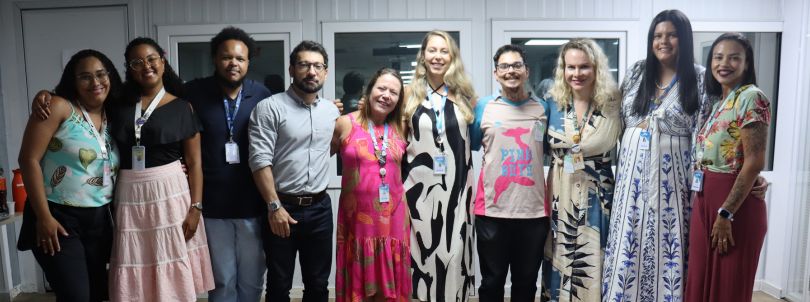
On February 5th, Fiotec held an event in celebration of Trans Visibility Month with the participation of Bárbara Aires, secretary of the Coordination of Equity, Diversity, Inclusion and Affirmative Policies (Cedipa/Fiocruz), and Ralph Duccini, poet and producer. The event aimed to broaden the debate on gender diversity and promote awareness of the challenges faced by the trans population in Brazil.
The administrative director of Fiotec, Marcelo Amaral, opened the meeting by highlighting the importance of plurality in the work environment. "The more plural and diverse, the richer it is. More debate, more discussions, more proposals, more ideas. The place will revolve around such important agendas for our society today," he said, emphasizing the need to disseminate this knowledge to society.
Bárbara, transvestite and speaker, began her presentation by addressing the concepts of gender, sexuality and diversity. She explained that while sex refers to biological characteristics, gender identity is a social construct. During the lecture, Bárbara provoked a reflection: what are gender roles? Are they not deterministic?
She also explained about the different gender identities:
• Cisgender: people whose gender identity corresponds to the sex assigned at birth;
• Transvestites: a person born with a penis, having the male gender assigned according to the genitals, who lives socially as a woman;
• Transexual: people who understand and live the opposite gender to the one assigned at birth;
• Transmasculine: people with vaginas, who identify with masculinity;
• Non-binary: people who do not identify exclusively as either male or female;
• Gender-fluid: people whose identity transitions between different genders over time.
The speaker also differentiated sexual orientation and gender identity, presenting the main types:
• Heterosexuality: attraction to people of the opposite gender;
• Homosexuality: attraction to people of the same gender;
• Bisexuality: attraction to more than one gender;
• Pansexuality: attraction regardless of gender.
Some frequently used terms were also addressed:
• Cisheteronormativity: the presumption that all people are cis and heterosexual;
• Homophobia: prejudice against homosexual people;
• Lesbophobia: prejudice against lesbian women;
• Biphobia: discrimination against bisexual people;
• Transphobia: discrimination against trans people.
The challenge of trans employability
Bárbara presented alarming data on trans employability. Low education and qualification are major challenges: more than 70% of trans people have not completed high school. In 2020, the World Bank estimated that 1.9% of the world's population was made up of trans or non-binary people.
The reality of the labor market is harsh: only 4% of transvestites are in formal jobs and only 0.02% of trans people have had access to higher education, according to data from the National Association of Transvestites and Transsexuals of Brazil (Antra).
Bárbara ended her presentation with a shocking fact: for the 17th consecutive year, Brazil is the country with the highest number of assassinations of trans people in the entire world.
Slam and artistic expression
After the lecture, Ralph Duccini brought a poetic presentation in a slam, a poetry recitation format that promotes artistic and social expression. His words were moving and brought deep reflections on trans experiences and the struggle for rights and respect.
Affinity Group: Fiocores
Fiotec has an affinity group called Fiocores, aimed at welcoming and supporting LGBT+ employees, promoting a more inclusive and diverse environment within the institution.
The event reinforced the importance of dialogue and education to build a fairer and more egalitarian society for trans people and the entire LGBTQIA+ community.


